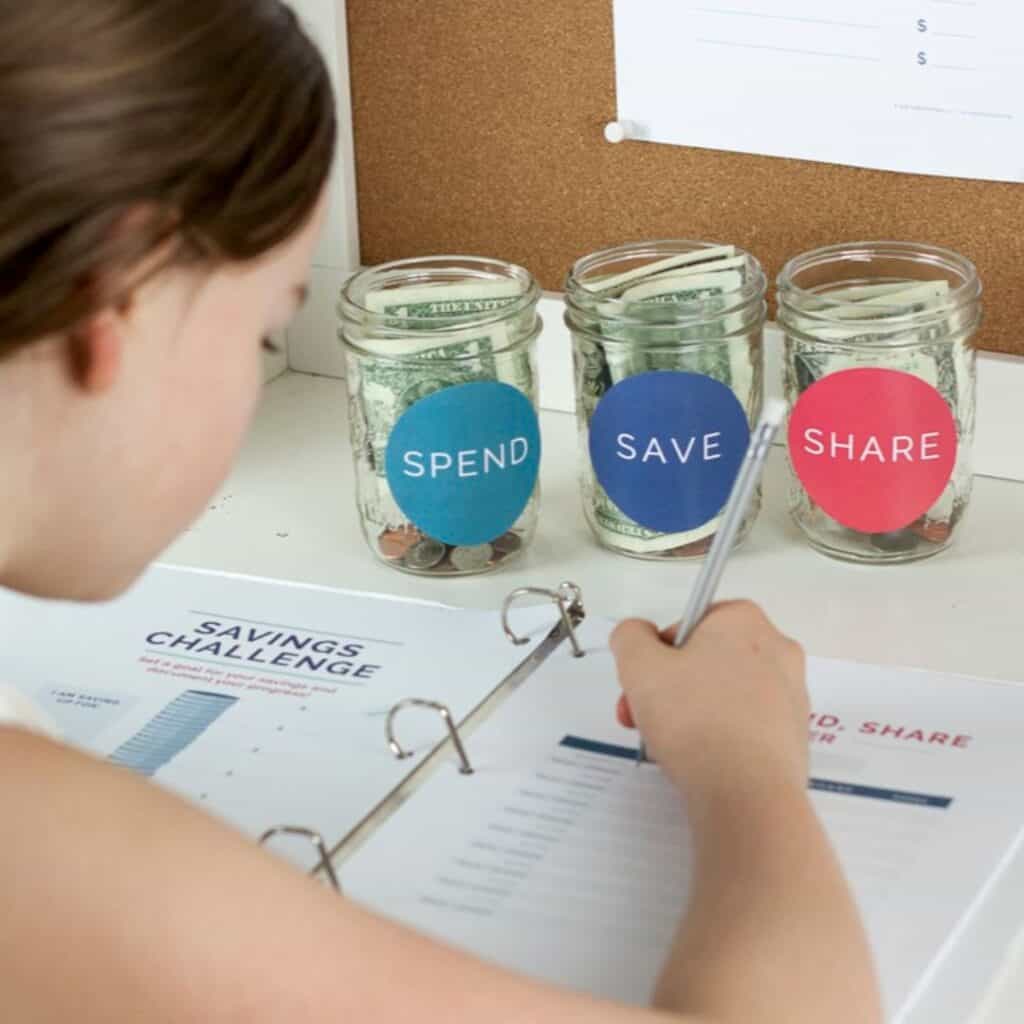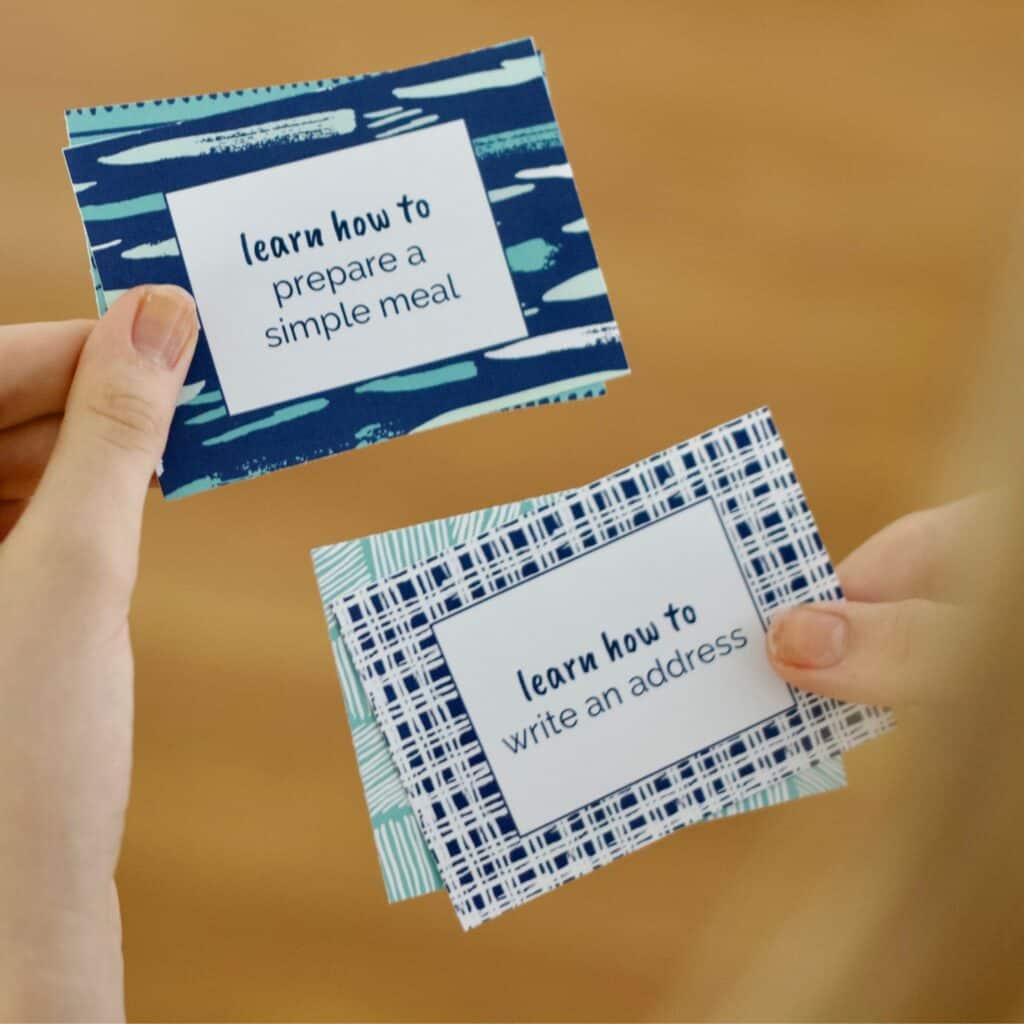10 Responsibilities at Home That Make Kids Feel Capable and Significant
These ten children’s responsibilities at home encourage a helping mindset in kids.
Kids want to have responsibilities at home.
“Really?!” you may be thinking.
But ultimately it’s true.
More than anything kids want to feel capable and significant in their family and the world.
And responsibilities at home can help achieve this.
Consider the opposite for a moment – a home where parents do everything for their child. While the motive of these parents comes from a sense of love, the message the child receives is that they’re incapable of doing anything on their own.
When parents encourage their kids to be responsible, they’re sending the opposite message – that their child is capable. And as a contributor to the family household and chores, a child also gains a sense of pride and significance.
That’s not to say that kids’ don’t resist taking on responsibilities. They often do. But the long term benefits of encouraging kids to be responsible outweigh the in-the-moment resistance.
10 Responsibilities kids can do at home
Below are ten responsibilities your child can begin doing now, by varying age-appropriate degrees:
#1 – Pick up messes
One of the first responsibilities parents encourage from their toddlers is to pick up toys after playing with them. While toddlers will never excel at picking up their own messes, asking them to help begins to encourage a responsible mindset. Parents can encourage toddlers to clean up other messes too such as cleaning up spills on counters or floors.
Young kids will continue to need encouragement and support from their parents to clean up messes. It’s important to keep in mind that clean-up projects that appear simple to adults may be overwhelming to kids. They’ll need guidance and support to help figure out how to complete the task successfully.
As our children mature into teenagers, it’s tempting to assume they should know better than to leave dirty socks on the living room floor or messy dishes on the kitchen table. Criticizing teens for not “knowing better” will only discourage them. Instead, work with your teen to problem solve how they can remind themselves to pick up messes. Change may not happen overnight but positive encouragement should eventually motivate teens to self-correct.
See related: 7 Tips to Help You Begin Toddler Chores Successfully
#2 – Take care of pets
Pets can add so much joy and excitement to a family home and also provide a great opportunity for kids to demonstrate real responsibility. After all, your child’s contribution to taking care of your pet directly impacts the pet’s wellbeing.
Pets need to be given nourishment daily and each type of pet has other requirements such as daily exercise, cage cleaning, claw clipping or maintaining the right PH of a water tank, as a few examples.
School-age children can help support parents in pet care, by placing a bowl of food down for the pet, for example. Older kids can be expected to contribute more by feeding a pet independently or cleaning a cage.
But parents need to keep in mind that expecting young kids to care for pets independently, with no prior practice, is unreasonable. Kids will still need coaching and support.
Before acquiring a pet it’s always important to assess how much care the animal needs and whether or not your family can successfully care for it.
See Related: Looking for The Best Family Pet? (Consider One of These)
#3 – Maintain a neat bedroom
Kids’ bedrooms are the one room in the house that belong to them. Even if kids share a bedroom with a sibling, it’s still a space in the house they have some possession over.
And while maintaining a neat bedroom is an opportunity for kids to demonstrate responsibility, it’s important to have realistic expectations about the cleanliness kids are capable of at different ages. The majority of children can’t be expected to maintain a perfectly neat room all the time.
In order to really let our kids be responsible for maintaining a neat bedroom, it’s important to let them have a voice in how this task will be accomplished. Dictating to kids when and how their rooms should be cleaned will only discourage them from learning how to achieve this goal independently.
Instead, work alongside toddlers and young children to clean up the room. As you do this, you’ll be modeling what it takes to keep a room tidy. As kids get older and more independent, discuss with them their plan to maintain a neat bedroom. It can also be helpful to agree on specific days and times each week, for example, when the room will be organized and cleaned.
See Related: 5 Tips to Get Your Kids to Clean Their Messy Room
#4 – Take care of laundry
Kids of all ages are able to contribute to laundry care to some extent.
Toddlers can contribute by pouring detergent into the machine, loading clothes into the dryer, pressing the start button and helping (or more like “helping”) fold clean clothes, socks or other small clothing items.
As kids get a little older, they can be given the responsibility of folding and putting away their own clothes, after parents clean them.
Around age ten, children can be taught how to clean and dry their own laundry in addition to putting clothes away. Kids will need a lot of help and guidance when learning this skill, and probably a few reminders to do their laundry.
With lots of practice, teens will (for the most part) be capable of completely taking over this task themselves, allowing them to confidently take care of their clothes independently.
See related: How to Teach Kids to Do Their Laundry Independently
#5 – Make their own meals
Cooking and preparing meals can be a fun activity for kids. And over time, as kids grow in their independence, they can begin to do these activities on their own.
Toddlers can help with meal prep in small ways such as taking food off of shelves, getting their own dishes, and helping to place food on plates.
Older kids can begin to learn how to cook with supervision, use child knives to cut vegetables, prepare their own breakfasts, and pack their own school lunches.
Tweens and teens, with instruction, can use real knives and cook on the stove. As they progress in their skills, older kids can be given the responsibility of making one dinner a week, if the schedule permits. Or simply cook or bake independently when they feel like it.
See Related: Teach Kids to Cook by Age and Ability
#6 – Have an allowance
Giving kids an allowance, and making them responsible for certain expenses, teaches real life responsibilities in budgeting, saving, and spending judiciously.
Kids won’t be ready to take on this responsibility until they have a solid understanding of addition and subtraction and can also identify coins and bills. It’s helpful to give kids physical money when starting an allowance so they obtain a solid money sense.
Parents should also talk to their children, and put in writing, which expenses they’re now responsible for so there’s no confusion. Common expenses kids can take over include paying for toys, art supplies, special snacks or treats, and books.
As kids get older, they can begin to receive their allowance through a debit card such as Greenlight. This will help familiarize them with using card machines and digital money. Tweens and teens can also be responsible for bigger expenses such as clothing or gas for the car.
See related: How to Get Started on Kids Allowance – The Right Way
The Kids Money Management Toolkit has everything you need (except money!) to begin giving your kids an allowance. In addition to guidance and advice, you’ll also receive Save, Spend, and Share jar labels, a Kids Money Ledger, a Savings Challenge Sheet, a Jobs-for-Hire Sheet, and a Kids Allowance Contract. Click here to learn more.
#7 – Do daily chores
Having daily household chores lets kids feel they’re an integral part of maintaining the family home.
Toddlers and preschoolers can do simple chores such as putting their dirty clothes in the hamper, helping to sweep the floor (with an age-appropriate broom) or giving the family dog his food every evening.
Older kids can take on more complicated tasks like putting away clean dishes in the dishwasher, setting the dinner table with utensils, washing windows or taking out the trash.
The primary goal of daily chores for kids is to encourage a mindset of helping. When kids are older they can begin to genuinely contribute to housework.
See Related: Age-Appropriate Chore Lists by Developmental Stage
Interested in getting your kids started on chores? My four-lesson course will teach you how to get started, avoid nagging & power struggles, and keep your kids motivated. Click here or the image below to learn more.

#8 – Take part in a family cleaning day
An extension of daily chores is having kids take part in a family cleaning day.
Setting aside one day each month (more or less) when the whole family cleans the house, can really build a sense of capability and significance in kids.
Kids feel a sense of accomplishment (although they may never admit it! ?) when they’ve independently cleaned an entire room themselves. Or, for younger kids, have taken on specific tasks alongside their parents as they clean the house.
Younger siblings won’t be able to have a significant impact on house cleaning, but encouraging any contribution, however small, will set the stage for their contribution in later years.
Around age seven or eight, kids can begin to clean “easy” rooms such as the living room or dining room, assuming that these rooms require little more than dusting, vacuuming and cleaning floors. Of course, children will need instruction to set them up for success and perfection can hardly be expected.
As kids enter the tween years, more can be expected of them as well as more independence. Kids at this age can begin to clean bathrooms (with instruction) and potentially clean more than one room. When siblings are involved, it’s helpful to trade off rooms each month and have in writing who is responsible for each room.
See Related: 8 Tips for Getting Kids to Help Clean the House
#9 – Manage routines
Parents are often told to follow a routine with their young children to help with temperament and transitions.
But kids of all ages benefit from the security of routines. And starting in toddlerhood, kids can also be involved in the planning of them.
Getting kids involved in routine planning helps build kids’ time management skills and get their buy-in for certain mundane activities they’re less inclined to do.
And as kids grow older, and have responsibilities like homework or extracurricular activities, routines can help them feel a sense of order. Routines can also ensure that assignments are turned in on time and sports equipment packed for the next day.
See Related: 6 Ways Kids Routines Encourage Independence and Bring Sanity to Your Life
#10 – Take part in gift giving
Giving a gift to someone else, whether it’s a friend, sibling, relative or neighbor, helps build a sense of selflessness in kids.
Kids of any age can help pick out gifts, wrap them, and give them to the recipient. Kids can also make their own special gifts and draw or write cards.
Receiving a gift is also an opportunity for children to learn graciousness through a “thank you” when receiving the gift and later, writing a thank you card.
See Related: Mindful Gift Giving in Families Shapes Children’s Values
Ready to teach your child life skills? These cards can help! Each card in this eighty-one deck contains a skill your child can begin practicing with you or on their own. Click here or the image below to learn more.
See Related:
How to Raise Responsible Kids – Not Just Obedient Ones
How to Stop Doing Everything for Your Kids and Teach Responsibility
How to Raise Responsible Kids Who Want to Help
6 Tips for Teaching Responsibility to Children: a Step-by-Step Guide
What to do next…
1. Subscribe to Self-Sufficient Kids’ email list.
Like what you read here and want to learn more? Every Thursday I’ll send you one parenting tip about raising self-sufficient kids and creating the peaceful relationship you yearn to have with your child. Click here to sign up.
2. Take one of my quizzes!
Find out if you’re raising a self-sufficient kid (click here) or if you’re doing too much for your kids (click here). At the end of each quiz, you’ll be asked to provide your email address to see the results.
3. Get your kids started on chores.
Learn how to get your child started on chores (& keep them motivated + avoid power struggles) by enrolling in my Get Your Kids Successfully Started on Chores course. Click here to learn more and sign up.

About Kerry Flatley
Hi! I’m Kerry, the mother of two girls and a certified parent educator. I believe it is possible for parents to have a supportive, loving, and warm relationship with their kids while raising them to be independent and ultimately self-sufficient. Over the years, I’ve read numerous books and articles that support this belief and I’ve put these ideas into practice with my own kids. Read more about me and Self-Sufficient Kids here.




